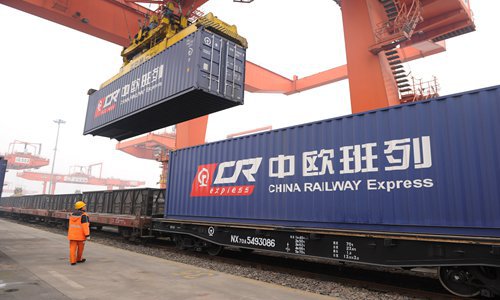HOME >> BUSINESS
China-EU railway link to be strengthened via communication
By Chu Daye Source:Global Times Published: 2019/6/9 21:38:40

A Chinese worker watches a container of China Railway Express being loaded onto a train at a railway station in Chengdu, capital of Southwest China's Sichuan Province in January. Photo: IC
The volume of a railway link between China and the EU can be doubled or more with improved communication among parties involved in the signature project, a key Russian executive involved in the train service said.
"[The railway bridge] will be able to double from the current volume if we carry out join planning, for instance, in this year or the next year," Alexey Grom, president of pan-Eurasian railway company United Transport and Logistics Company – Eurasian Rail Alliance (UTLC ERA), told the Global Times over the weekend.
UTLC ERA is a state-owned, joint-stock company registered in Moscow and co-owned by partners Russian Railways, the National Union Belarusian Railway and Kazakhstan Temir Zholy, the national railway company of Kazakhstan.
"The dynamics of our railway transit transportation could be better than the way it is planned at the moment. The capacity is much wider than the current volumes," Grom said.
UTLC ERA works with the China Railway Express (CR Express), also known as the "Belt and Road on rail," once containers leave the Chinese or EU borders.
"Sometimes, we feel everything is done already, but next steps are showing us a lot of potential is not used yet," said the UTLC ERA president, who attended the just-concluded 23rd St. Petersburg International Economic Forum.
The momentum for the China-EU railway bridge is good at the moment with growing demand and more cities in China and Europe being linked by the train service, said Grom.
The volume has grown from 40,000 twenty-foot equivalent units (TEUs) in 2015 to 370,000 TEUs in 2018, according to UTLC ERA, which handled about 280,000 TEUs of the 2018 trade.
Grom's comments came as Chinese media reported that the Chinese central government is asking local governments to cut subsidies to such train services and as US sanctions on Russia have affected the willingness of some European producers to use the service.
China's Ministry of Finance has required local governments to cap the level of subsidies at 30 percent of the total freight rates by 2020, according to a report by domestic news site cb.com.cn on June 5. In 2019, the cap would be 40 percent.
"Actually, not only China is subsidizing these trains. Railway infrastructure in Russia, Belarus and Kazakhstan have declared special tariffs for such train services, which are 50 percent less than complete tariffs," Grom told the Global Times, noting that there will be an impact if China, as a major source of goods, rolls back subsidies.
"We try to be competitive without such subsidies, aiming to cut cost by 30 percent from the 2015 level and to offer competitive rates for our services in two years," said Grom.
But subsidies for this project are investment for the future, Grom said.
By the end of March 2019, the CR Express rail had connected 60 Chinese cities with 50 cities across 15 European countries, with more than 14,000 cargo trains on the network transporting vehicles, laptops, food items, garments, and small commodities.
Growing transportation links between China and Europe also offer more opportunities for increasing Russian exports to China, Grom said, indirectly helping an ambitious target among the two countries to boost bilateral trade to $200 billion by 2024.
Newspaper headline: Eurasian railway link to be strengthened via communication